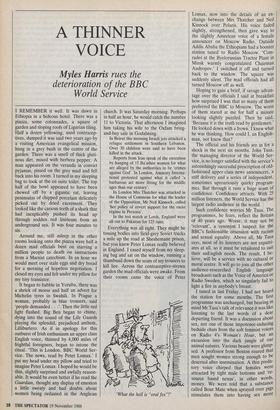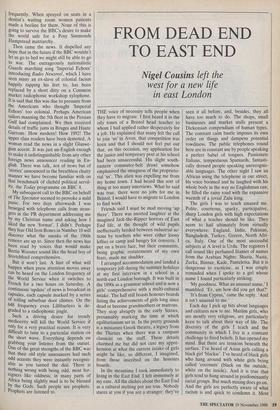A THINNER VOICE
Myles Harris rues the deterioration of the BBC
World Service
I REMEMBER it well. It was dawn in Ethiopia in a hideous hotel. There was a piazza, some colonnades, a square of garden and sloping roofs of Ligurian tiling. Half a dozen yellowing, used contracep- tives, dumped it was said two years ago by a visiting American evangelical mission, hung in a grey bush in the centre of the garden. There was a smell of thick gluti- nous dirt, mixed with berbera pepper. A man appeared on the veranda in convict pyjamas, pissed on the grey mud and fell back into his room. I turned in my sleeping bag to look at the en suite toilet. The top half of the bowl appeared to have been chewed off by a gigantic rat, leaving peninsulas of chipped porcelain delicately picked out by dried excrement. They looked like the carious teeth of a shark that had inexplicably pushed its head up through sodden red lin6leum from an underground sea. It was four minutes to six.
Around me, still asleep in the other rooms looking onto the piazza were half a dozen mad officials bent on starving a million people to death on instructions from a Marxist catechism. In an hour we would meet over stale eggs and dry bread for a morning of hopeless negotiation. I closed my eyes and felt under my pillow for my tiny transistor.
It began to babble in Yoruba, there was a shriek of morse and half an advert for Michelin tyres in Swahili. In Prague a woman, probably in blue trousers, said `people demanded . . .'. Then the little red light flashed. Big Ben began to chime, dying into the sound of the Life Guards playing the splendid, prejudiced anthem, Lilliburlero. As if in apology for this outburst of Irish enthusiasm an upper class English voice, thinned by 4,000 miles of frightful foreigners, began to intone the ritual. 'This is London. BBC World Ser- vice. The news, read by Peter Lomax.' I put my head under my pillow and tried to imagine Peter Lomax. I hoped he would be thin, slightly surprised and awfully reason- able. It would be even better if he read the Guardian, thought any display of emotion a little sweaty and had doubts about women being ordained in the Anglican church. It was Saturday morning. Perhaps in half an hour, he would catch the number 11 to Victoria. That afternoon I imagined him taking his wife to the Oxfam bring- and-buy sale in Godalming.
In Beirut this morning Israeli jets attacked a refugee settlement in Southern Lebanon. Over 30 children were said to have been killed in the attack.
Reports from Iran speak of the execution by hanging of 15 Ba'athist women for what are alleged by the authorities to be 'crimes against God'. In London, Amnesty Interna- tional protested against what it called 'a barbarous act more fitting for the middle ages than our century'.
In London Mrs Thatcher was attacked in the House of Commons for what the leader of the Opposition, Mr Neil Kinnock, called `her policy of covert support for the racist regime in Pretoria'.
In the test match at Lords, England were all out to Pakistan for 123 runs.
Everything was all right. They might be tossing bodies into field-grey Soviet trucks a mile up the road at Sheshemane prison, but you knew Peter Lomax really believed in England. I eased myself from my sleep- ing bag and sat on the window, running a thumbnail down the seam of my trousers to kill lice. Across the contraceptive-strewn garden the mad officials were awake. From their rooms came the voice of Peter `What the hell is "oral fex"?' Lomax, now into the details of an ex- change between Mrs Thatcher and Neil Kinnock over Polaris. His voice faded slightly, strengthened, then gave way to the slightly American voice of a female announcer on Moscow Radio. Outside Addis Ababa the Ethiopians had a booster station tuned to Radio Moscow. 'Com- rades at the Byelorussian Tractor Plant in Minsk warmly congratulated Chairman Andropov.' I switched it off and turned back to the window. The square was suddenly silent. The mad officials had all turned Moscow off as well.
Hoping to gain a brief, if savage advan- tage over the officials I said at breakfast how surprised I was that so many of them preferred the BBC to Moscow. The worst of them stared at me for half a minute looking slightly puzzled. Then he said, `Because it is the truth read by gentlemen.' He looked down with a frown. I knew what he was thinking. How could I, an English- man, not know that?
The official and his friends are in for a shock in the next six months. John Tusa, the managing director of the World Ser- vice, is no longer satisfied with the service's astonishingly successful prescription of old- fashioned upper-class news announcers, a stiff delivery and a series of independent, sometimes uproariously quirky program- mes. But through it runs a huge seam of confidence. Confidence attracts. With 25 million listeners, the World Service has the largest radio audience in the world.
Such confidence worries Mr Tusa. The programmes, he fears, reflect the Britain of 40 years ago. Worse, it may not be `relevant', a synonym I suspect for the BBC's fashionable obsession with racism and sexual equality. Above all, Mr Tusa says, most of its listeners are not expatri- ates at all, so it must be retailored to suit their unEnglish needs. The result, I be- lieve, will be a service with no cultural or moral centre. It will go to join all the other audience-researched English language broadcasts such as the Voice of America or Radio Sweden, which so singularly fail to light a fire in anybody's breast. I tuned in last Friday. I had not heard the station for some months. The first programme was unchanged, but bearing in mind Mr Tusa's talk of relevance it was like listening to the last words of a dear departing friend. It was a discussion about sex, not one of those impotence-inducing bedside chats from the soft feminist voices on Radio 4's Woman's Hour, but an excursion into the dark jungle of our animal natures. Various beasts were glimp- sed. A professor from Boston roared that men sought women strong enough to be deserted after insemination. A thin preda- tory voice chirped that females were attracted by tight male bottoms and 're- source based nexus', in other words, money. We were told that a substance called Boar Mate when sprayed over pigs stimulates them into having sex more
frequently. When sprayed on seats in a dentist's waiting room women patients made a beeline for them. None of this is going to survive the BBC's desire to make the world safe for a Posy Simmonds Hampstead matriarchy.
Then came the news. It dispelled any hope that in the future if the BBC wouldn't let us go to bed we might still be able to go to war. The outrageously nationalistic Guards marching song 'Imperial Echoes' introducing Radio Newsreel, which I have seen many an ex-slave of colonial facism happily tapping his feet to, haS. been replaced by a short ditty on a Common market radiophonic workshop xylophone. It is said that this was due to pressure from the Americans who thought 'Imperial Echoes' too colonial. Perhaps American sailors manning the 5th fleet in the Persian Gulf had complained. We then received details of traffic jams in Bruges and Haute Garrone. How modern! How 1992! The upper class readers have been demoted. A Woman read the news in a slight Glaswe- gian accent. It was just un-English enough to make it indistinguishable from any other foreign news announcer reading in En- glish. There was talk, not of news but of `stories' announced in the breathless chatty manner we have become familiar with on that benchmark of cliched political servil- ity, the Today programme on BBC 4. My subsequent call to the BBC on behalf of The Spectator seemed to provoke a mild panic. For two days afterwards. I was besieged with telephone calls from stran- gers in the PR department addressing me by my Christian name and asking how I liked the new 'format'. I didn't. Perhaps they fear Old Iron Bones in Number 10 will discover what the sneaks of the 1960s remove are up to. Since then the news has been read by voices that would make Bertie Wooster sound like the head boy of Stretchford comprehensive.
But it won't last. A hint of what will happen when press attention moves away can be heard on the London frequency of the World Service when it switches to French for a two hours on Saturday. A continuous 'update' of news is broadcast in capsules, each capsule marked by a series of tolling suburban door chimes. On the 648 frequency even Lilliburlero is de- graded to a radiophonic jingle. Such a driving desire for trendy mediocrity will kill the World Service if only for a very practical reason. It is very difficult to tune to a particular station on the short wave. Everything depends on grabbing your listener from the outset. One of the great strengths of the BBC was that their old style announcers had such odd accents they were instantly recognis- able as you turned the dial. There is nothing wrong with being odd, most for- eigners like oddness; in many parts of Africa being slightly mad is to be blessed by the Gods. Such people are prophets. Prophets are listened to.























































 Previous page
Previous page